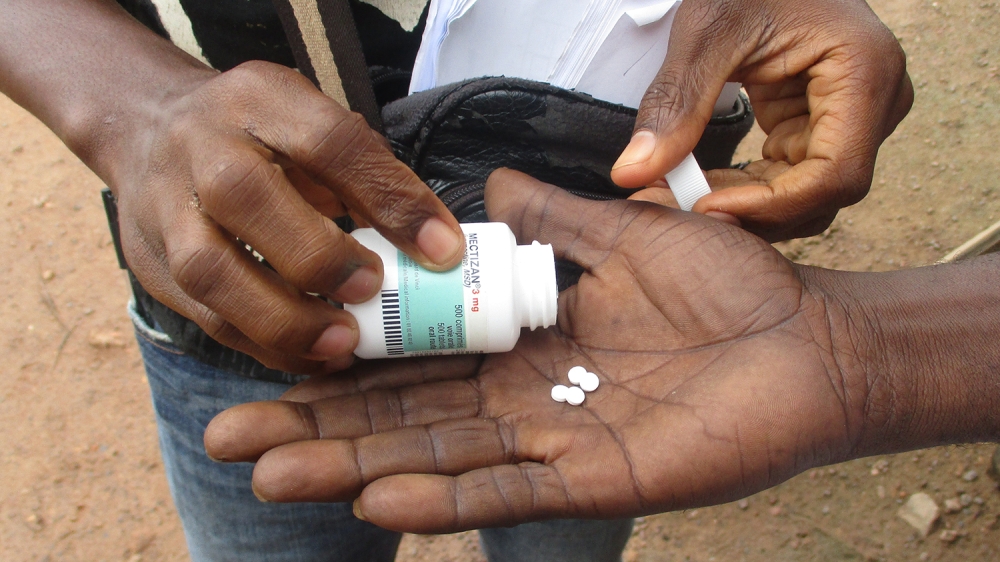

Schistosomiasis is a disease that is caused by blood flukes (parasites) of the genus Schistosoma. Schistosoma affects 200 to 300 million people worldwide in tropical climates. Schistosomiasis is especially common in tropical and subtropical regions where there is a lack of access to safe drinking water and sanitary facilities.
Estimates suggest that at least 90% of people requiring treatment for schistosomiasis reside in Africa.
Three species of blood flukes are found to cause illness in African regions.
The larval forms of the parasite, released from snails in fresh water bodies, can cause infestation by penetrating intact skin.
Individuals engaging in activities such as bathing, swimming, or fishing in water bodies harbouring infected freshwater snails are at a heightened risk of contracting the infection. As larvae develop into adult worms, they travel through veins and their smaller branches before settling in the urinary bladder, ureter (tubes connecting the kidney to the bladder) or intestines, where they produce and lay eggs.
Urine or stool can pass out some of these eggs which may come into contact with water and contaminate snails, leading to potential human infection.
The development of clinical manifestations is the result of the body's attempts to contain the infection. The severity of the illness varies depending on the number of eggs deposited, the infected person’s level of resistance, and the organ in the body affected.
At first, an individual may present with rashes over their body as a result of an allergic reaction triggered by the parasite. If the urinary system is affected, they may experience a painless discharge of blood in the urine. Individuals with bladder involvement have a substantially heightened probability of developing cancer of the urinary bladder. This may bring about abdominal discomfort and fever. Furthermore, kidneys may be detrimentally affected, resulting in kidney failure.
The increased tension of the portal vein is a result of heightened flow through the portal venous system, which drains impurities from the abdominal cavity. This can lead to an enlargement of the liver and spleen, as well as an accumulation of fluid in the peritoneal cavity.
Schistosomes and portal hypertension can damage liver cells, potentially leading to liver failure, its associated complications, and ultimately, coma and death.
After entering the liver, some species of parasite start to feed on the red blood cells, resulting in the patient becoming increasingly weak and anaemic. If one develops an allergic reaction to the presence of worms in the body, this can affect the lungs and result in a cough. Additionally, Schistosomes can damage pulmonary vessels, leading to pulmonary hypertension and other associated clinical difficulties.
Sores in the genital area can make the person more susceptible to HIV infection. In rare cases, eggs can be deposited in the brain or spinal cord, leading to paralysis and other neurological issues.
Given that schistosomiasis affects multiple organs, one can comprehend the severity of the infection. Even after receiving treatment, the infection can be eliminated, however, any resultant damage to the organs can remain.
In order to avoid organ damage, early diagnosis and treatment of schistosomiasis should be prioritised, especially in individuals with known and/or suspected allergies, urinary tract issues, and/or liver complications who live near lakes and ponds.
Diagnosis of the condition can be established through simple stool and urine analyses, as well as serological tests and biopsy of any affected parts. Treatment typically requires long-term use of anti-parasitic medications.
As it is a long-term disabling condition, prevention is critical. A key initial step is to raise awareness among those who are at risk, such as those located near lakes and other water sources.
If any symptoms of skin rashes or vesicles appear, those engaging in water activities should seek medical help as soon as possible. Schistosomiasis can be effectively managed through widespread medication among at-risk populations, access to clean water, better sanitation habits, knowledge and attitude changes, and control of snails and improvement of the environment.
Intermittent preventive drug therapy is also beneficial for high risk groups.
Dr Rachna Pande is a specialist in internal medicine.


